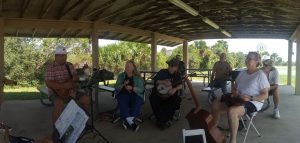
To include your event in the Briefing and Live Calendar, please fill out this form.
Weather: See the daily weather briefing from the National Weather Service in Jacksonville here.
Today at a Glance:
The Saturday Flagler Beach Farmers Market is scheduled for 9 a.m. to 1 p.m. today at Wickline Park, 315 South 7th Street, featuring prepared food, fruit, vegetables , handmade products and local arts from more than 30 local merchants. The market is hosted by Flagler Strong, a non-profit.
Keep Palm Coast Clean: It’s a Litter-ALL Effort: You can make a difference and be part of the collective effort to keep our city litter-free. Join the City of Palm Coast for the “Keep Palm Coast Clean” litter pick-up event on Saturday, January13th, from 8 a.m. to 1 p.m. Volunteers will meet at the Public Works Department located at 1 Wellfield Grade, just off US-1. Multiple roadways are designated as focus areas for the event. See the list here. There will be awards. The city will provide: Litter-Ready Gloves, Eco-Friendly Trash Bags, Refreshments to Fuel Your Effort, Safety Measures for a Litter-Free Day. The schedule:
8 a.m. – 8:30 a.m. Briefing & introduction along with location assignments
9 a.m. – 11:30 a.m. On-site cleanup
12 p.m. – Closing Ceremony to Celebrate a Litter-Free Victory
The event is FREE to participate in and we’re actively seeking volunteers, like you, who want to make a difference in our community! Individuals or groups interested in volunteering can send an email to [email protected].
First Coast Costumers Guild Meeting, 1 p.m. at Cut Up and Sew, 569 Cypress Edge Dr, Palm Coast. This is a group for people of all ages and skill levels who are passionate about the creative process of costuming. Whether you’re a seasoned pro with hundreds of costumes under your belt, or just starting out, this group is for you.
Active Shooter Defense, 9 a.m. to noon at First Baptist Bunnell, 2301 Commerce Pkwy, Bunnell. This training gives you strategies and skills to survive an active shooter incident. Whether you carry a concealed weapon or you are unarmed, we are going to teach you how to put yourself, and your family, in a position to survive. The cost is $19.99.
Gamble Jam: Musicians of all ages can bring instruments and chairs and join in the jam session, 2 to 5 p.m. . Program is free with park admission! Gamble Rogers Memorial State Recreation Area at Flagler Beach, 3100 S. Oceanshore Blvd., Flagler Beach, FL. Call the Ranger Station at (386) 517-2086 for more information. The Gamble Jam is a family-friendly event that occurs every second and fourth Saturday of the month. The park hosts this acoustic jam session at one of the pavilions along the river to honor the memory of James Gamble Rogers IV, the Florida folk musician who lost his life in 1991 while trying to rescue a swimmer in the rough surf.
American Association of University Women (AAUW) Monthly Meeting, 11 a.m. at Cypress Knoll Golf Club, 53 Easthampton Blvd, Palm Coast. A monthly speaker is featured. Lunch is available for $20 in cash, $21 by credit card, but must be ordered in advance. The lunch menu is available on our website. Lunch may be ordered by sending an email to: [email protected].
Grace Community Food Pantry, 245 Education Way, Bunnell, drive-thru open today from 10 a.m. to 1 p.m. The food pantry is organized by Pastor Charles Silano and Grace Community Food Pantry, a Disaster Relief Agency in Flagler County. Feeding Northeast Florida helps local children and families, seniors and active and retired military members who struggle to put food on the table. Working with local grocery stores, manufacturers, and farms we rescue high-quality food that would normally be wasted and transform it into meals for those in need. The Flagler County School District provides space for much of the food pantry storage and operations. Call 386-586-2653 to help, volunteer or donate.
In Coming Days:

Storytime: Malamud’s “Angel Levine,” first published in Commentary in December 1955. Manischevitz is a 51-year-old Job. He’s a tailor, but his business burned down. His son was killed in the war. His daughter “married a lout and disappeared with him as off the face of the earth.” He’s in physical pain. His wife Fanny is in worse pain. She’s wasting away. She had to stop sewing and washing. Manischevitz doesn’t understand the “sheer quantity of woe, incomprehensible,” lavished on him by an invisible, indifferent god. He comes home one day to find “a black man reading a newspaper” in the living room. Manischevitz is astonished, but he doesn’t panic, as a white man coming home in 1955 New York might (as a white man coming home in 2024 still would, though it’s not clear how color would have anything to do with the astonishment). He asks the man –“a large man, bonily built”–what he’s doing there, simply. The man introduces himself as Alexander Levine, an angel in the making. He’s not yet there. Not yet an angel. He’s in a transition, an apprentice of sorts. He has to earn it, and he tells Manischevitz that he’s here to help. “I was translated,” is how he got into the apartment. Also, he’s not just any kind of angel. He’s a Jewish angel. Jewish or not, Manischevitz throws him out. What is one to make of a line like this: He had heard of black Jews, but had never met one. It gave an unusual sensation.” The line gives an unusual sensation. But he soon seeks him out. His woes are too much. He finds Levine in a Harlem honky-tonk, where a woman is gyrating lusciously against him. This, before the era of lap dances. Or about 300,000 years into the era of lapdances, homo sapien wise. Manischevitz is turned off, leaves, goes to a synagogue, asks god why he’s been abandoned, goes back to Bella’s, where he’d first seen Levine in Harlem, or what he thinks is Bella’s–it isn’t, or no longer is. He finds it to be changed, as if it had become “a synagogue in a store,” with four Negroes with skullcaps reading and discussing a scroll spread before them. It’s a vaguely philosophical or theological gathering, until one of them tells Manischevitz where he could find Levine: at Bella’s down the street. He goes. He’s not welcomed there, but he sees Levine, who tears up when Manischevitz doubts him: “How you have humiliated me,” he tells him. (I did not understand the line, unless it’s not more than it says: Manischevitz doubted the angel in the making, denying him a chance to prove himself, the angel was hurt.) But the two of them walk to Manischevitz’s apartment building and walk up to the roof, where “the door was already padlocked.” The transition here are vague, but it’s a Malamud trait, this intentional suggestiveness, just enough to keep Malamud from having to be accountable for realistic prose. Through a small broken window Manischevitz hears “an odd noise, as though of a whirring of wings,” and “could have sworn he saw a dark figure borne aloft on a pair of strong black wings.” It looks like the angel got his wings. Downstairs, Fanny is feeling fine again, wielding a dust mop. “A wonderful thing, Fanny,” he tells her. “Believe me, there are Jews everywhere.” The charm of the story, if charm there is (I am not sold) is in the matter-of-factness that had to have been a touch inspired by a combination of “It’s a Wonderful Life” nine years earlier and Brown v. Board of Education a year earlier, if with a bit of a patronizing tone: why a Black angel? Malamud is exploring Job through Black-Jewish comity and comedy, garlanding his thread with the supernatural, what would in a decade or so be called magic realism: Garcia Marquez’s richer, less didactic “A Very Old Man With Enormous Wings” is 13 years in the future. That angel also finally flies away after a few struggles. But I find Garcia-Marquez’s angels more convincing, in this country where seven in 10 Americans still believe in angels. Come to find: Jan Kadar directed “The Angel Levine” in 1970, with Harry Belafonte as the angel. Belafonte had been away from moviemaking for 10 years. He returned, on his own wings, to produce this. Roger Greenspun of the New York Times, Wikipedia quotes, wrote that “given the reputations of the talents involved, [the film is] a failure of major proportions. I have seen worse movies. But I cannot remember having seen a movie so nervously at odds with itself, so timid in its impulses, and so mistaken in its choices.” Oddly, that’s how I felt about the story, though I seem to be a minority of one on that score.
—P.T.
View this profile on Instagram
![]()
The Live Calendar is a compendium of local and regional political, civic and cultural events. You can input your own calendar events directly onto the site as you wish them to appear (pending approval of course). To include your event in the Live Calendar, please fill out this form.
December 2025
Free For All Fridays With Host David Ayres on WNZF
Scenic A1A Pride Meeting
Friday Blue Forum
Acoustic Jam Circle At The Community Center In The Hammock
Rotary’s Fantasy Lights Festival in Palm Coast’s Town Center
Kwanzaa Celebration
Flagler Beach Farmers Market
Coffee With Flagler Beach Commission Chair Scott Spradley
Grace Community Food Pantry on Education Way
Peps Art Walk Near Beachfront Grille
Gamble Jam at Gamble Rogers Memorial State Recreation Area
Rotary’s Fantasy Lights Festival in Palm Coast’s Town Center
For the full calendar, go here.

Manischevitz was profoundly disappointed at the return of his active pain and suffering. He had hoped for a longer interval of easement, long enough to have a thought other than of himself and his troubles. Day by day, minute after minute, he lived in pain, pain his only memory, questioning the necessity of it, inveighing, though with affection, against God. Why so much, Gottenyu? If He wanted to teach His servant a lesson for some reason, some cause–the nature of His nature to teach him, say, for reasons of his weakness, his pride, perhaps, during his years of prosperity, his frequent neglect of God–to give him a little lesson, why then any of the tragedies that had happened to him, any one would have sufficed to chasten him. But all together the loss of both his children, his means of livelihood, Fanny’s health and his- that was too much to ask I one frail-boned man to endure. Who, after all, was Manischevitz that he had been given so much to suffer? A tailor. Certainly not a man of talent. Upon him suffering was largely wasted. It went nowhere, into nothing: into more suffering. His pain did not earn him bread, nor fill the cracks in the wall, nor lift, in the middle of the night, the kitchen table; only lay upon him, sleepless, so sharply oppressive that he could many times have cried out yet not heard himself this misery.
–From Malamud’s “Angel Levine” (1955).








































Pogo says
@In memory of Bernard Malamud
https://www.google.com/search?q=Bernard+Malamud
James says
“…There is still a good deal of resistance to the responsibility of politics and resentment of the burden of decision. Indeed, the young today want to drop out altogether – in a frightening revival of the hostility to responsibility that made the younger generation of forty years ago so receptive to totalitarian promises and slogans. …”
“… Indeed, scorning power only makes it more oppressive. Power has to be used. It is a reality. If the decent and idealistic toss power in the gutter, the guttersnipes pick it up. If the able and educated refuse to exercise power responsibly, irresponsible and incompetent people take the seats of the mighty levers of power. Power not being used for social purposes passes to people who use it for their own ends. …”
“… But there is even greater danger… vulnerability to false leaders. It is not true that young people repudiate leadership. They seek leadership. They need leadership. If they cannot find it in the ‘estabishment’ … they become easy prey to the demagogues. If one ‘cannot trust anyone over thirty,’ one trusts, in the end, someone who acts juvenile. For one has to trust someone.”
Peter F. Drucker, 1969 (from “The Age of Discontinuity – Guidelines to Our Changing Society”).
He then goes on to further note the “frightening resemblance” between the student youth movement of the day with that of the “Wandervoegel” of the German youth movement who also stated not to trust anyone over thirty… whom he noted became some of the most “fanatical, dedicate, unquestioning Nazis.”
“… The young want and need faith. And the demagogues is the specialist in ‘sincerity.’…”
Ray W. says
Thank you, James.
James says
A very interesting, somewhat sobering read I must admit… read it several years ago (2018) after coming by it quite by accident several years prior. Not a priority, just a curiosity.
Those quotes were indeed shocking to read back then (considering the times) and stuck with me to this day. I suppose more so since they sort of reaffirmed what I’d already concluded, but was reluctant to accept/articulate… at least not with such succinct clarity and flair.
I certainly wouldn’t have used “guttersnipe,” but then one must consider from where it came… another reminder that perhaps all things are relative.
Peace.